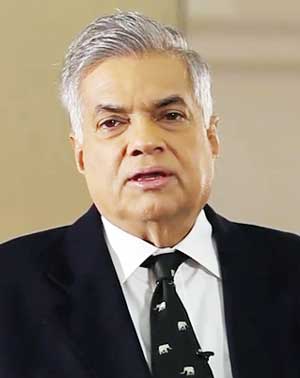Wednesday Feb 18, 2026
Wednesday Feb 18, 2026
Saturday, 9 December 2017 00:26 - - {{hitsCtrl.values.hits}}
By Ashwin Hemmathagama – Our Lobby Correspondent
Prime Minister Ranil Wickremesinghe yesterday briefed Parliament about Government plans to bring down the cost of living while compensating farmers affected by climate change.
Regretting the sudden hike in cost of living the PM however, assured it would be controlled by January-February next year.
Addressing the Parliament yesterday, the Prime Minister laid out the short-term measures. “A shortage of 40 million coconuts per month has been predicted from January to May 2018. Import of rice and coconut kernel would be allowed as necessary to control their prices in the local market. We have already given approval to import 200,000 MT of rice. Vegetables and other food items would also be imported if the necessity arises while taking extra care not to affect the local farmers,” he said, promising a mechanism to provide relief to the farmers affected by extreme weather within two weeks.
“The vegetable cultivation has also gone down by 30%. We expected 14,798 HA in the upcountry and 32,216 HA in the low country to have vegetables. But it was less than what we expected – 10,715 HA in up country and 19,673 HA in the low country.
The FAO has warned the rice production will also go down by 40%.
Despite the warnings issued by the Metrology Department, the adverse weather conditions affected the agriculture. So, a shortage of supply was seen in the market and the prices were pushed up. We should import food if the production goes down,” he added.
“The impacts of climate change will be channelled primarily through the water cycle, with consequences that could be large and unevenly across the globe. Water-related climate risks cascade through food, energy, urban, and environmental systems,” held the Prime Minister.
According to the PM, the economic growth predicted at 5.5% of the GDP in 2017 dropped to 4.5% due to drought and floods. He said the agricultural sector showed a -1.2% negative growth. “Even though we got considerable rainfall in November, the monsoon rains were less than expected. We will have to take measures to control the rice prices until the next Maha season harvest reach the market by April next year. I am not giving you the excuses. We are ready to take the responsibility. But the reality must be explained. The Cabinet when it met last Tuesday and Thursday extensively discussed the measures to bring down the cost of living,” he said.
“I believe we need to prepare our economy to be resilient to climate changes. We need to prepare a new mechanism for that purpose. As the agriculture sector has shown a negative growth, we need to accelerate the growth in other sectors of our economy if we are to attain the stipulated economic growth targets,” he added.
Showcasing the urgent efforts of the Government to appoint a high-level committee comprising of the Secretaries of Finance, Disaster Management, Home Affairs and Agriculture Ministries assigned to report to the Cabinet with a suitable mechanism to identify the affected farming families and provide relief the PM said: “A Cabinet Subcommittee comprising of Ministers Patali Champika Ranawaka, Susil Premajayantha, Anura Priyadarshana Yapa and Rauf Hakeem has been appointed to study the impact of climate change on agriculture and make recommendations.”
Getting global attention to the inclement weather conditions in Sri Lanka in search of help, the Prime Minister plans to have meetings with relevant stakeholders and representatives of the World Bank and Asian Development Bank next week to discuss the impact of climate change on the economy and decide the future course of action.
Meanwhile, the UPFA joint opposition Parliament group leader, MP Dinesh Gunawardena brought the attention of the Prime Minister to take steps to reduce the post-harvest damages, highlighting that 37-40% harvest is wasted due to lack of proper storage facilities. The PM agreeing with the comment stated that it would be looked in.